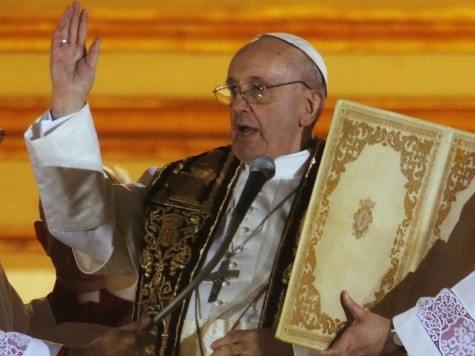This morning, Cardinal Jorge Bergoglio, a Jesuit priest born in Argentina to parents of Italian ancestry, was elected leader of Roman Catholic Church, taking the name Francis.
To non-Catholics, and even to many Catholics, the full significance of all of these details may be lost.
First of all, Francis is not the first non-European-born pope – the Church has had three already from North Africa alone – but he is the first non-European-born pope in over a millennium. He hails from South America, home to a huge number of the world’s Catholics and the ancestral home of many more living in North America.
Expect general insanity when Pope Francis – as he is confirmed to do – attends the 2013 World Youth Day in Rio de Janeiro this July. The last international gathering of the event originated by John Paul II attracted roughly a million-and-a-half young pilgrims in Madrid in 2011; this year’s could prove a good dry run for crowd control at Rio’s upcoming 2016 Olympics.
Pope Francis is well-educated, multilingual, and has a degree in chemistry, but he’s not part of the Roman Curia, the inner circle of bureaucrats that run the day-to-day affairs of the Vatican. He represents a part of the world that still has a deep connection to the Catholic faith and, while it’s subject to the same secular influences as Europe and North America, has not succumbed to them to the same degree.
He is, though, the first pope to come from the Society of Jesus, founded by Saint Ignatius Loyola in 1540, members of which are popularly known as Jesuits. The Jesuits have been known as scientists – the director of the Vatican Observatory is Father Jose Gabriel Funes, an Argentinian Jesuit — physicians, missionaries, scholars, and teachers, operating schools, colleges and universities worldwide.
But the Society hasn’t always been accepted. In the mid-18th century, the Jesuits had acquired a reputation for meddling in politics in Europe, to the point where they were expelled from several European nations and had their assets seized. Pope Clement XIV suppressed the order in 1773, as Catholic countries threatened to split from Rome over Jesuit activities, almost extinguishing the Society.
In 1814, Pope Pius VII lifted the suppression. Since then, the Jesuits have made a strong comeback. But the religious orthodoxy of the order, and its obedience to the Holy See, has come under question in recent years.
Speaking to the 35th General Congregation of the Society of Jesus in early 2008, Pope Benedict XVI issued a call for greater obedience and a clearer and less ambiguous commitment to Church teaching,
At the same time, many Jesuit universities – from Georgetown to Boston College to Loyola Marymount – have become increasingly secularized and are losing their distinctive Catholic identities.
The Cardinal Newman Society, a nonprofit organization named after former Anglican priest Cardinal John Henry Newman and dedicated to renewing Catholic identity on campuses, lists no Jesuit institutions on its list of recommended U.S. Catholic colleges and universities.
By all accounts, though, the new pontiff adheres to the Church’s teachings on such social issues as abortion, euthanasia, same-sex marriage, and adoption by same-sex couples. At the same time, just before Easter 1999, about a year after being named an archbishop, he went to a Buenos Aires hospital and washed the feet of 12 AIDS patients (echoing a passage in the Gospel of John in which Jesus washed his disciples’ feet).
But Bergoglio has also been known for a strong devotion to economic justice and the welfare of the poor, reflected in his simple lifestyle. Rejecting both his archbishop’s mansion and personal driver, he lived in a small Buenos Aires apartment, took public transportation, and cooked his own meals.
In choosing the name Francis, he has set off a debate whether he was honoring St. Francis of Assisi, the beloved monk and mystic who founded the Franciscan Order of Friars Minor, or the Jesuit evangelist St. Francis Xavier.
As reported by NBC News, elector Cardinal Timothy Dolan of New York City confirms that Pope Francis is named after St. Francis of Assisi. In a tweet, @NBCNews said, “He says The Pope specifically explained that to the Cardinals.”
Of course, many people have only heard of St. Francis in his role as the patron saint of animals, but he’s much more than that. He reported a vision of Christ, which said to him, “Francis, repair my Church, which, as you can see, is falling into ruins.”
So, with all the challenges facing the Roman Catholic Church in Her heart at the Vatican and around the world, the new pontiff has set himself a mighty task.

COMMENTS
Please let us know if you're having issues with commenting.